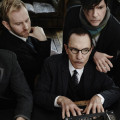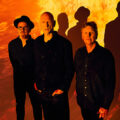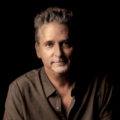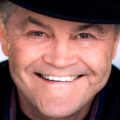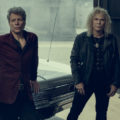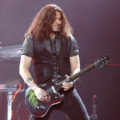He’s a beauty: Fee Waybill examines The Tubes from the “Outside Inside” prior to Park West
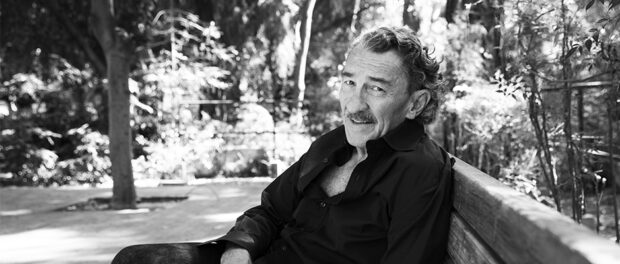 Photos provided by Wolfson Entertainment Inc.
Photos provided by Wolfson Entertainment Inc.
Wild, wacky, weird and wonderful are just a few words that would appropriately fit but still fall short of fully describing the unclassifiable theatrical rock enigma and fabulous freak show known as The Tubes.
The San Francisco-based band started in the 1970s by turning underground upside down with cult favorites “Don’t Touch Me There” and “White Punks On Dope,” accompanied by technologically-advanced productions, outrageous characters, over the top costumes and comedy that all seemed to jump straight out of a scene from “The Rocky Horror Picture Show” crossed with a “Saturday Night Live” sketch.
Once the 1980s came into view with a cameo in the mega movie “Xanadu,” followed by the birth of MTV, The Tubes irreverently tore up America’s television sets (and radios) with “Talk To Ya Later” and the chart-topping “She’s A Beauty,” propelling their corresponding albums, “The Completion Backward Principle” and “Outside Inside,” to strike sales gold.
Front man Fee Waybill, also an occasional actor, solo artist and songwriter for others,
waxed nostalgia with Chicago Concert Reviews now that the latter project is coming to the Park West on Saturday, July 9, while also touching on creative partnerships with super producer David Foster, local hit maker Richard Marx and a catastrophic but utterly hilarious accident outside the old Uptown Theatre.
What made you want to perform “The Completion Backward Principle” in its entirety and then switch to all of “Outside Inside” for the Park West?
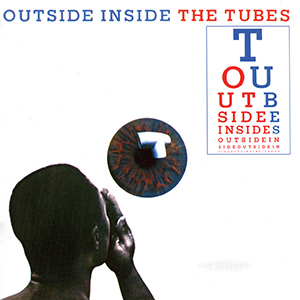 Fee Waybill: We always wanted to do that because a lot of bands have done their famous album. We started [with “The Completion Backward Principle”] in 2019. It had been 40 years since we wrote that record. We wrote that in ‘79, it came out in 1980 and it’s always been my favorite record. These shows were supposed to be sometime before the pandemic and we were doing it back then, but this is like the second or third time they’ve been postponed and rescheduled because of COVID, so we’ve moved on and started doing the “Outside Inside” record from top to bottom, and then a whole bunch of other songs, all those perennial kind of set list songs: “White Punks On Dope,” “Talk To Ya Later,” “What Do You Want From Life,” “Mondo Bondage.” A lot of those songs on “Outside Inside,” we never played live, like “Glass House,” “No Not Again” or “Fantastic Delusion.” I don’t know why, after all these years. We had to put the record on, listen to each of them, and try to figure out the chords and the background vocals. It was pretty interesting to try to figure out songs you’d written, but you didn’t know how they went.
Fee Waybill: We always wanted to do that because a lot of bands have done their famous album. We started [with “The Completion Backward Principle”] in 2019. It had been 40 years since we wrote that record. We wrote that in ‘79, it came out in 1980 and it’s always been my favorite record. These shows were supposed to be sometime before the pandemic and we were doing it back then, but this is like the second or third time they’ve been postponed and rescheduled because of COVID, so we’ve moved on and started doing the “Outside Inside” record from top to bottom, and then a whole bunch of other songs, all those perennial kind of set list songs: “White Punks On Dope,” “Talk To Ya Later,” “What Do You Want From Life,” “Mondo Bondage.” A lot of those songs on “Outside Inside,” we never played live, like “Glass House,” “No Not Again” or “Fantastic Delusion.” I don’t know why, after all these years. We had to put the record on, listen to each of them, and try to figure out the chords and the background vocals. It was pretty interesting to try to figure out songs you’d written, but you didn’t know how they went.
Can you trace how The Tubes went from having a cult-like following on the underground to increased popularity with each of those projects?
Waybill: We signed to A&M Records and they liked the idea of having a weird, theatrical, kind of punky band on their label. They had The Carpenters, Captain & Tennille and these really middle of the road acts. We made five records there on A&M. We had one kind of Top 40 hit with “Don’t Touch Me There” on the second record, “Young And Rich,” and we kind of had an AOR hit with “White Punks On Dope,” released as a live version on “What Do You Want From Live,” which was our fourth album. The last record that we released there, “Remote Control,” was the same thing. There was no single and there was not a huge sales figure, so they went, “it’s been great having you guys and you’re kinda a cult band on our label, but we’re releasing you because you’re still un-recouped,” even though we had developed this incredible live performance reputation and we were doing great, just having incredible, theatrical, art rock shows.
But that kind of money doesn’t come back to the record company, so they released us and we went to Capitol Records. It changed our world because we met David Foster. That was part of the deal. “We really want a band that’s gonna get on the radio more and sell more records than your past history.” So we said, “well, okay” and we got in the studio with David Foster. The guy was so brilliant. He had just come from a number one song with Earth, Wind & Fire, so he knew what a hit looked like and he changed everything for us.
How did you feel about becoming such a defining act of early MTV right around then?
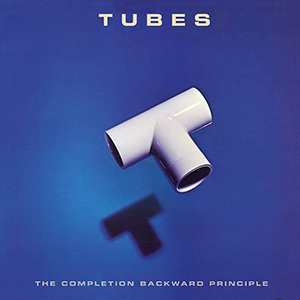 Waybill: We had been doing videos way before MTV. We used to video everything and play it during our shows, so we were thrilled to be able to jump into that genre with MTV. The one thing about it that was daunting was we were a little too weird for MTV. They had a grip on the censorship and they wielded it. They censored a number of our things, but we recognized the value of that kind of advertisement and enhancing the viability of your band, so we played their game. I actually went on MTV quite a few times. I was a guest VJ a number of times and we would have them out to see us. I was doing a charity car race, off-road racing, and I did a guest VJ stint in my racing suit. I actually got them to bring the truck that I drove in the Baja 500 all the way to New York City and into the MTV studio. It was pretty cool. They actually wanted me to sign on as a VJ for MTV at one point, but I didn’t want to move to New York City.
Waybill: We had been doing videos way before MTV. We used to video everything and play it during our shows, so we were thrilled to be able to jump into that genre with MTV. The one thing about it that was daunting was we were a little too weird for MTV. They had a grip on the censorship and they wielded it. They censored a number of our things, but we recognized the value of that kind of advertisement and enhancing the viability of your band, so we played their game. I actually went on MTV quite a few times. I was a guest VJ a number of times and we would have them out to see us. I was doing a charity car race, off-road racing, and I did a guest VJ stint in my racing suit. I actually got them to bring the truck that I drove in the Baja 500 all the way to New York City and into the MTV studio. It was pretty cool. They actually wanted me to sign on as a VJ for MTV at one point, but I didn’t want to move to New York City.
But it was a fun ride there at MTV, that’s for sure, and that video for “She’s A Beauty” was a big deal, although that was another thing that they censored on us because we wanted it to be a lot weirder than it was. We had a whole storyboard that we put together [based on] this movie by Tod Browning called “Freaks.” It came out in the 1930s and was all about a side show with the sausage man, the chicken woman and the pinhead. It was the love story about how the chicken woman fell in love. It was pretty grotesque. We wanted to do a whole video around that and make it really weird, really freaky and MTV didn’t buy it. They said “no, no, no, you can’t have nudity. You can’t have paraplegics. You can’t do it. It’s too weird,” so we had to rethink the whole thing. The video for “She’s A Beauty” was actually the plan B, but I don’t know, I miss MTV and all those videos. You got to see the band guys up close, but that’s the way it goes. What are you going to do?
What made you want to go solo, and shortly thereafter, step down entirely from the group?
Waybill: It was the good, bad and the ugly of David Foster. He was a brilliant producer and a brilliant arranger, but he wanted to make hits. When we did the first album with him, he put me together with [Toto’s] Steve Lukather and we all wrote “Talk To Ya Later,” which was a big hit. Then we wrote “She’s A Beauty” on the second album and that was an even bigger hit. He wanted big hits on the radio and that’s what the record company wanted, but it kind of flew in the face of a band that had been together 15 years and he’s telling us, “no, I want to do this. I want to do that. I want to do a whole side of just hits with Lukather and Fee.” The band couldn’t handle it and I understand it.
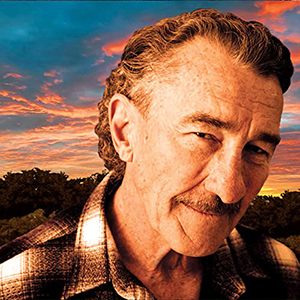 So that’s why on the third album that we did for Capitol, the band decided, “we’re not gonna work with Foster again” and we made a record with Todd Rundgren. While they we were making that record in San Francisco, Foster said, “you know, you’ve kind of canned me here and I’m available. You want to come to L.A. and make a solo record?” So I went to L.A. and I made my first solo record, “Read My Lips,” and then came back to San Francisco and finished off the “Love Bomb” album with the band. I like that album, but it was not the kind of commercial success of the two previous ones, so then Capital released us and I just felt, “I think it’s time. I think I need to explore the world on my own and see what happens.” Gosh, we were so burned out. We had toured like 15 or 16 years in a row. We would make a record in January/February/March, and then in April, we’d go out and we’d tour [America] all year long until December, or go to Europe, or go to Canada. Eight to nine months in a bus wears on you…
So that’s why on the third album that we did for Capitol, the band decided, “we’re not gonna work with Foster again” and we made a record with Todd Rundgren. While they we were making that record in San Francisco, Foster said, “you know, you’ve kind of canned me here and I’m available. You want to come to L.A. and make a solo record?” So I went to L.A. and I made my first solo record, “Read My Lips,” and then came back to San Francisco and finished off the “Love Bomb” album with the band. I like that album, but it was not the kind of commercial success of the two previous ones, so then Capital released us and I just felt, “I think it’s time. I think I need to explore the world on my own and see what happens.” Gosh, we were so burned out. We had toured like 15 or 16 years in a row. We would make a record in January/February/March, and then in April, we’d go out and we’d tour [America] all year long until December, or go to Europe, or go to Canada. Eight to nine months in a bus wears on you…
I moved to L.A. and I started writing songs with Richard Marx. That was an eye opener. Richard sold a lot of records. He and I became best friends and we’re still best friends. We have written hundreds of songs together and I’ve got songs on pretty much all of his albums. Then after eight years of sitting around, I was going crazy not being able to [tour] and I didn’t feel like I was ready to start a solo career, so we went back to The Tubes in ‘94 and we’ve been together since, playing everywhere. Then, finally, two years ago with the pandemic, I made another solo album with Richard, “Fee Waybill Rides Again,” so I feel like I’m ready now. We have plans to do some solo shows down the line. I think that’s gonna be part of my future.
Does anything come to mind about playing around Chicago from any point?
Waybill: You want to hear a funny story? In the late ‘70s, we were playing the Uptown Theatre, so we’re there for soundcheck in the afternoon. We had just changed management companies and Rikki Farr was our manager. He had a sound and lights company, and he developed a whole new PA system was called Turbo. It was a big, wooden PA system with these special horns that sounded so great. It was one of a kind and we were touring with it, but the equipment truck was running late that day. We were standing out in front of the theatre [waiting] and we see the truck barreling down this street, and like half a block away, there’s an “L” overpass.
The truck apparently doesn’t realize that it’s not gonna fit under the “L” and he never even slowed down. He just rammed into this “L” overpass and peeled the entire top off of the trailer of the truck! The truck’s trailer and the brand new Turbo PA system comes spewing out over the cab onto the street and just busts into a million pieces, wood chips flying everywhere, and this is all happening right before our very eyes (laughs). It was just unbelievable and the truck is just stuck underneath there! The gear is spread out on the street in front of it and we’re just all standing there going “oh no, oh no!” So the rest of the day, we start picking up pieces of the Turbo system. We sent somebody out to get like 25 rolls of gaffer tape, and we gaffer taped the whole thing back together (laughs) and did the show that night. I’ll never forget that…
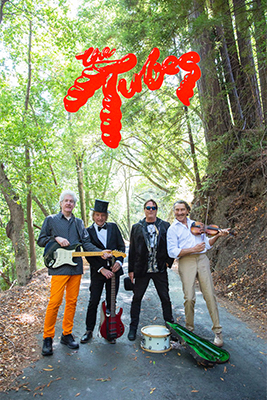 It was just a disaster, but we’ve had a lot of good shows in Chicago over the years. I really like Chicago. I’ve been there a number of times and seen shows all over there. We’ve played at the City Winery once. We’ve played all kinds of different venues. We haven’t played the Park West in a long time, probably since the ‘80s or ‘90s, and that’s a really cool venue. I really remember it and I’ve been to see other bands there a number of times. Richard lived in Chicago for years and years. He grew up there and raised his sons there, so I’ve been there quite a number of times. I used to go every summer to spend a week with Richard and the boys. We would go to Rush Street and hang out, and go to the lake. It’s a fun city.
It was just a disaster, but we’ve had a lot of good shows in Chicago over the years. I really like Chicago. I’ve been there a number of times and seen shows all over there. We’ve played at the City Winery once. We’ve played all kinds of different venues. We haven’t played the Park West in a long time, probably since the ‘80s or ‘90s, and that’s a really cool venue. I really remember it and I’ve been to see other bands there a number of times. Richard lived in Chicago for years and years. He grew up there and raised his sons there, so I’ve been there quite a number of times. I used to go every summer to spend a week with Richard and the boys. We would go to Rush Street and hang out, and go to the lake. It’s a fun city.
How are the theatrics shaping up these days?
Waybill: I’m still doing Quay Lewd. In fact, before the last tour I had to completely revamp the giant Quay Lewd shoes… [The repair shop owner] looked at me like, “what? You wear these?” “Yeah, well, it’s a theatrical thing. I don’t wear ‘em around town. I wear them on the stage.” So they put in a bunch of steel plates and put ‘em all back together. I’m gonna do probably six or eight different characters and costume changes in the show for sure.
Where do you hope The Tubes wind up in the history books?
Waybill: I don’t know (laughs). It’s hard to write your own legacy, but I think visually and theatrically speaking, The Tubes were the greatest show on earth. The greatest rock show on earth, definitely. We had a reputation, or have a reputation, that really can’t be surpassed, I don’t think. Nobody is doing the kind of theatrics that we do, combined with the music…Something happens when we get on the stage. Some kind of mysterious mist floats over all of us and we just gel together. Of course, being together for 50 years probably doesn’t hurt either. We pretty much know what everybody is gonna do. The great thing is that we never really burned out. We took a break in the middle of our career where we all just stopped, and then all of a sudden, we all went, “you know gosh, I don’t want to retire.” So everyone still has that joy that you get when you’re playing in front of people and you can see the joy in their face. It’s all about bringing that joy. That’s why we try to keep it funny and light, do interesting stuff and change it every time. That’s why instead of doing “The Completion Backward Principle,” now we’re gonna do “Outside Inside.” We don’t really do a show more than a year or so, then we’ve gotta change it up so it will be fun and I’m sure it will be fun playing Park West!
The Tubes perform at the Park West on Saturday, July 9. For additional details, visit TheTubes.com and JamUSA.com.

